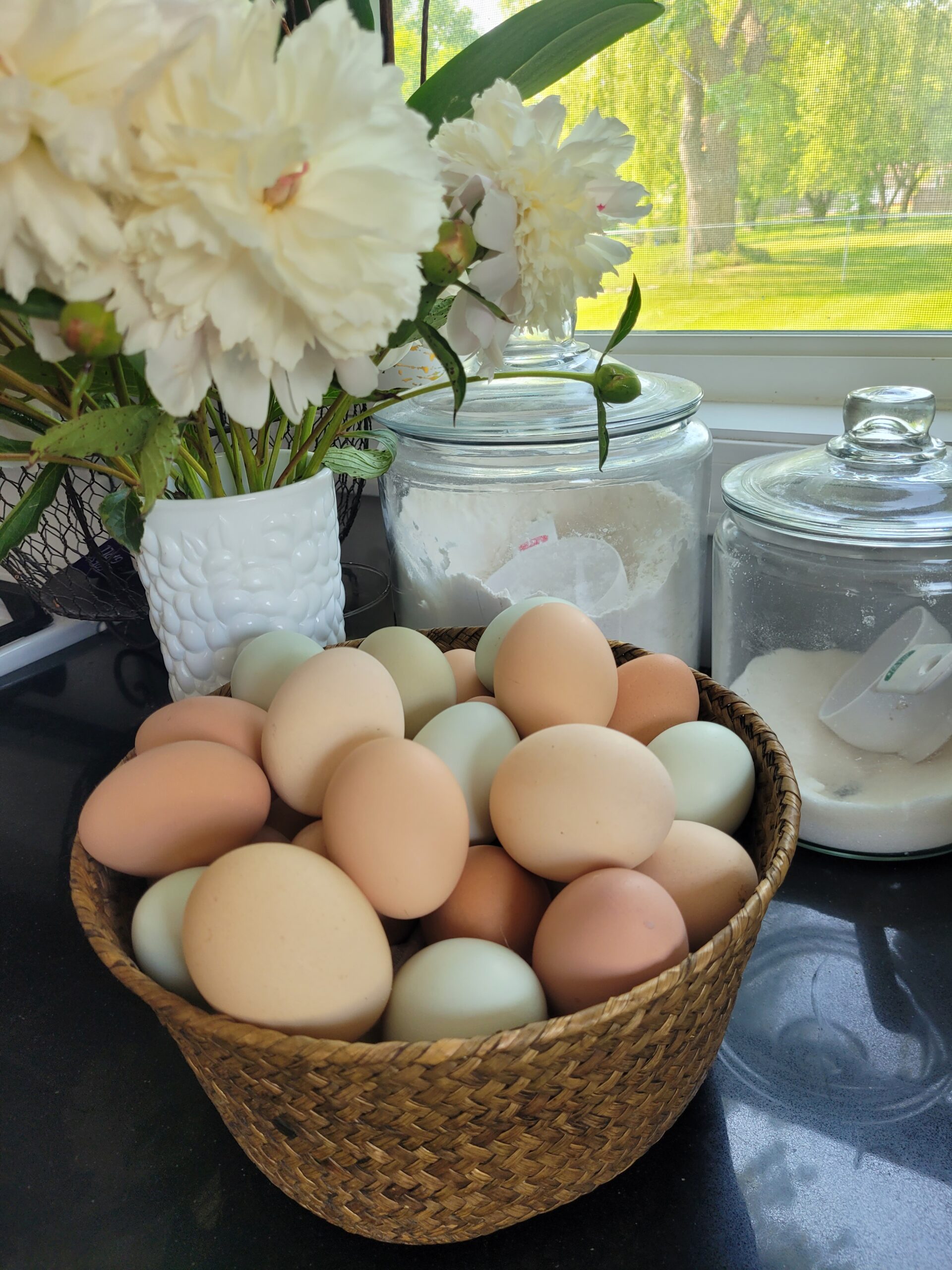Fresh is best. That simple statement is definitely true when it comes to the nutritional benefits and taste of a fresh egg from a free ranged chicken. (Free range refers to the practice of allowing a chicken time outside of a coop or run with access to fresh grass and organic matter)
Eggs are an excellent source of protein. Eggs also offer many other nutritional benefits and are one of the few foods classified as SUPERFOOD (food that has many nutritional benefits resulting from exceptional nutrient density). Eggs are a great source of Vitamin A (promotes a healthy immune and reproductive system, growth development and supports vision and organ health), Multiple B Vitamins (lowers risk of heart disease and stroke, boosts immune system, reduce migraines, improve vision, decreases risk for dementia, keeps hormones healthy) Selenium (powerful antioxidant, reduces risk for certain cancers, promotes heart health, helps prevent mental decline, thyroid health) Folate (important in red blood cell formation and healthy cell growth and reduces the risk of birth defects of the brain and spine) Phosphorus (needed for the growth and repair of all tissues and cells and the production of DNA and RNA, balances other vitamins) Calcium (builds and maintains strong bones, promotes heart, muscle and nerve health, may help protect against cancer diabetes and high blood pressure) and Zinc ( supports immune system, reduces inflammation, boosts bone strength and brain health, good for skin and wound healing, crucial for growth and development). The average large egg is 75 calories but can contain up to 6 grams of protein and 5 grams of healthy fat. However, there are nutritional differences in grocery store eggs and chickens raised on a small farm or in your backyard. Grocery store eggs can be up to 60 days old. 60 days! Nutrients in food degrade over time. According to a Mother Earth News study, farm fresh eggs have less cholesterol and saturated fat. They can also contain 25% more Vitamin E, 75% more beta carotene, and up to 20 times more Omega 3 acids than eggs found in the grocery store.
Commercial Eggs vs Farm Fresh Eggs
So where do grocery store eggs come from? The majority of eggs available in grocery stores come from huge factory farms. On these farms, chickens are crowded into cages or packed so tightly into buildings that they are unable to move, stretch or spread their wings. The cramped and dark conditions cause the stressed chickens to peck each other (sometimes to death), some of these “farms” will actually remove part of the hen’s beaks to prevent this from happening. This is very painful and cruel to the hens, further decreasing their already poor quality of life. These commercial farms are exempt from most animal cruelty laws. As more people are becoming aware of the horrific conditions these animals endure, the factory farms have created more appealing labeling of their products such as “cage-free” and “organic” but have not improved the living conditions for the hens. This is why I always encourage people to do their research and know where their food comes from and encourage a homesteading lifestyle.
In comparison, farm-raised or backyard chickens are allowed ample time outside either in an outside run or allowed to free range. My “girls” are allowed to free range in my (fenced) yard when I am home and able to supervise them. Because I am in an urban area (and have a 4-foot fence around my yard), I don’t worry much about large predators (coyote, fox or neighborhood dogs) too much, but I do worry about hawks. Interestingly, I’ve observed that when there is a hawk in the area, the crows that nest near my yard sound an alarm which causes my chickens to run to their coop for safety. I still don’t take any chances and I only let them out of their run when I’m home and can check on them frequently. Chickens raised on small local farms or backyards are allowed to live their best life – eating bugs and worms, scratching in the dirt, and taking luxurious dust baths. They are usually given nutritious snacks and fresh fruit and vegetables in addition to their daily feed and receive medical care if needed.
So, if you are looking for the highest nutritional value and ethical farming is important to you – I encourage you to raise your own chickens for eggs or support a local farmer.
If you have been thinking about raising your own chickens, check out my post on how to build a sturdy and affordable chicken coop from a horizontal storage shed, and keep following for more tips on raising chickens.




